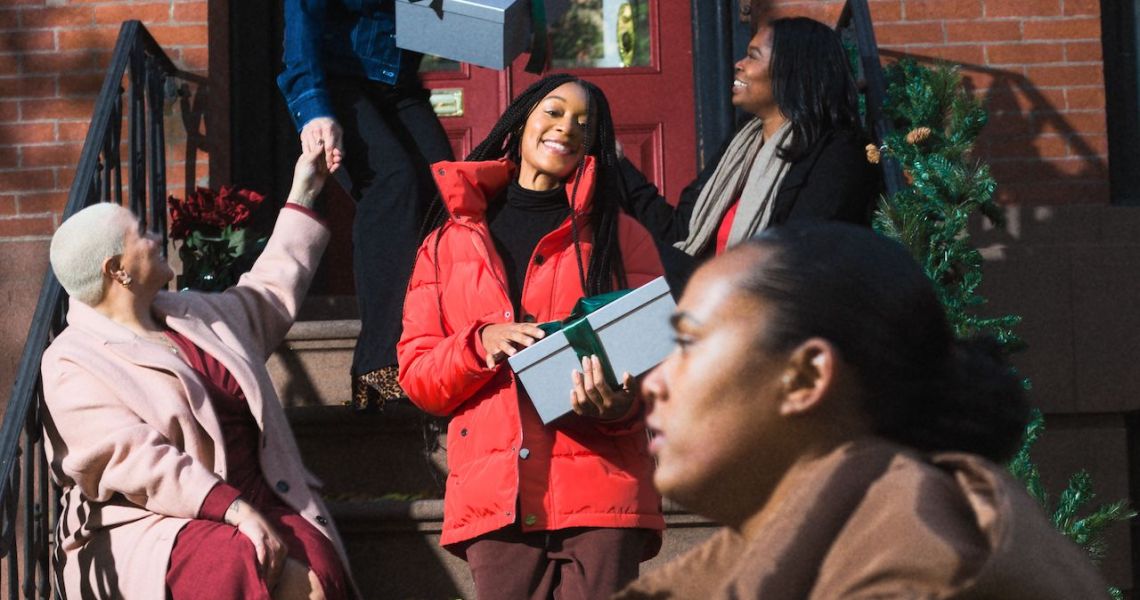Fashion brands are toning down their holiday marketing speak in a less-than-wonderful year.
Rather than pushing must-have gifts, stressing shipping deadlines and investing in happy, jolly campaigns, brands are throwing their holiday playbooks out the window. With Americans dealing with unprecedented health and economic concerns and hardships, marketers have read the room and are approaching the season with fresh care and consideration.
“Over the past few years, we’ve had messaging that compared our clothing to condoms, because it’s ribbed, and we sent the clothing in a big condom wrapper. And we’ve said, ‘Cashmere coming soon,’ in pictures of goats having sex that we put up all over New York City,” said Matt Scanlan, co-founder and CEO of Naadam.
This year, it’s a different story. “There’s a lot of cancel-culture stuff out there; people are more easily triggered in 2020, and that’s because a lot of really important stuff has happened,” said Scanlan. “So playing off the fact that we need to be more sensitive, we didn’t go in that direction.”
For 2020, Naadam’s holiday campaign centers on fake negative reviews of its products. For example, one ad features a one-star review titled “Can’t unsee it,” paired with an image of an older woman posing. “We gave our grandma your sweaters,” it states. “Now we get selfies. Every hour. With tongue.”
The ads are running on Naadam’s digital channels and via OOH ads in NYC. Scanlan said a majority of the brand’s revenue is generated in the last 45 days of a typical year. Thus far, its 2020 sales are up by close to a triple-digit percentage year-over-year.
Lindsay Bressler, COO of maternity apparel brand Hatch, echoed the need for a marketing refresh: “It’s been a funny line to walk, because we want to be celebratory and do our usual holiday jig,” she said. “But at the same time, we really want to be sensitive to what our consumers are going through right now.”
As opposed to marketing focused on moms-to-be hitting the town and showing off their bumps, as Hatch has employed in prior years, the 2020 holiday campaign leans on messages around nostalgia, celebrating at home and spending quality time with family. A Hatch email that went out at this time last year focused on traveling via a weekend getaway or a trip home for the holidays. This week, the brand’s emails have spotlighted dressing for a Zoom Friendsgiving and tips for quiet evenings well-spent.
Promoting ease around gifting is also a unique priority, thanks to the mental exhaustion many people feel this year, said Bressler. So, Hatch has launched discounted product bundles pegged to price tiers, like three beauty products for under $100. They’re featured in its online gift guide, which is also being promoted in emails and in social channels, including Pinterest.
Universal Standard is on the same page, with its Black Friday promotion that will center on 50 outfits that will be shoppable on its website via discounted bundles — because “shopping everything piecemeal” online isn’t easy, said the company’s co-founder and creative director, Alex Waldman. She added that all of the looks were styled “to be worn in the comfort of small company or at your home.”
”The perspective that we’ve taken for this holiday is ‘how to be happy where you are,’” she said. That’s in contrast to holiday 2019, when the brand featured messaging like “for the occasion,” next to a picture of a woman wearing a dress, and the copy “shine all season.” Also new to its marketing this year will be TV ads — two are currently airing on networks including E!, CNN and MSNBC.
Leading up to Christmas, Universal Standard will release 27 limited-edition styles created for the season. In addition, it will run sales and promote its Blue Jeans Go Green initiative, allowing shoppers to bring in an old pair of jeans to be recycled to get a new pair for $25.
“We just want to make sure that we’re contributing something that’s lighter,” compared to standard holiday marketing,” said Waldman. “We want our approach to be as palatable and accessible, and delightful as can be.”
Dolan also switched gears, both to align with the times and its new focus. It’s pivoted since March from being a contemporary fashion brand to focusing on “products that protect and care,” said founder Jodie Dolan. Its current product assortment includes loungewear made to increase blood flow, antibacterial gloves and masks.
“In past years, we would be talking about sequin pants and special party dresses, and celebrations,” said Dolan, noting that the company started messaging holiday last week. “Now, our whole strategy is really making sure our customers feel cared for and caring for our community.”
Dolan also runs The Laundry Truck L.A., which provides laundry services for homeless men and women. Whereas last year the brand was “more focused on selling products,” this year, Dolan is hellbent on rallying its community around the brand’s initiatives and activism efforts. Instagram posts point to supporting its non-profit sister company with every purchase, and online product pages spell out its one-for-one model of donating a mask with select purchases.
“Brands tend to have a perspective of a brand, rather than of people,” said Vic Drabicky, founder and CEO of consultancy January Digital. “But brands are moving away from the push toward consumerism. Instead, they’re saying, ‘We have a place in your life, and that’s an important place, but we aren’t the only thing in your life.’ And it feels authentic.”
That’s especially necessary this year, said Dolan. “What’s strange is seeing any [brand] going along this year like it’s business as usual, with the same, inauthentic, generic-looking posts with holiday-looking products,” she said. “That’s really insensitive.”
For her part, she’s focused on being sensitive at every touchpoint. “We’re not going to be alarmists, like, ‘Shop now! Shop now!’ because there could be a delay in shipping,” she said. “We’ve all experienced enough noise and fear tactics over the last few months.”




